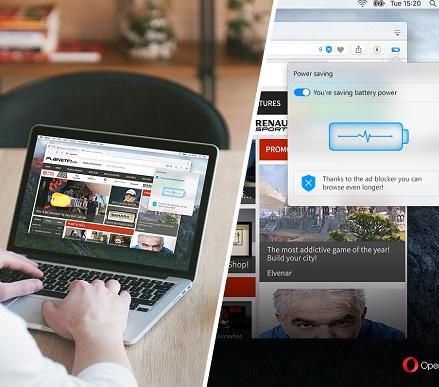Opera has made some under-the-hood enhancements to its Web browser to help extend laptop battery life. Other new features focus on security, privacy, and efficiency.


9 Detachable Tablets To Replace Your PC
9 Detachable Tablets To Replace Your PC (Click image for larger view and slideshow.)
Opera has rolled out a power-saving feature for its browser as it attempts to woo new users with a host of new features to enhance the Web surfing experience.
Currently available in the developer stream, Opera claims the power-saving mode extends the laptop battery life by up to 50% compared with earlier versions of the Opera browser and to Google Chrome.
The new power-saving mode is one of several new features Opera has rolled out in only the last weeks that have focused on improving privacy, security, and efficiency when it comes to its Web browser. The company also introduced a free virtual private network, as well as an ad-blocking feature.
Opera made the power-saving mode possible by focusing on browsing optimizations, such as reducing activity from background tabs, adapting page-redrawing frequency, and tuning video-playback parameters.
The company is also testing a smarter way of managing memory to that ensure frequently opened tabs like Gmail and Facebook will be more responsive. Some parts of the code have been simplified, while animated themes have been optimized.
"It's extremely frustrating to run out of battery on your computer, whether you are out traveling, watching videos, or you have just left your charger behind," Krystian Kolondra, senior vice president of engineering for Opera, wrote in a May 12 statement. "Our new power saving mode will nudge you when the laptop starts to consume battery, and, when enabled, it can increase the battery life by as much as 50%."
When the user's laptop power cable is unplugged, the battery icon appears next to the search and address field in the Opera browser. Clicking the battery icon activates the power-saving mode.
The browser will also detect when the laptop's battery is running low, and will suggest that the user enable power-saving mode.
Among the other under-the-hood optimizations are:
reducing activity in background tabs
waking the CPU less often, due to more optimal scheduling of JavaScript timers
automatically pausing unused plug-ins
reducing the video playback rate to 30 frames per second
To further boost battery life, Opera has tuned its video playback parameters, has forced the use of hardware accelerated video codecs, and has paused animations of browser themes.
[Read how Opera is bringing its VPN to iOS.]
The announcement follows Opera's decision in April to include of a VPN component for its desktop Web browser, allowing users to access region-restricted websites and shield their browsing when on public WiFi networks.
The free VPN client, which offers unlimited data usage, as well as 256-bit encryption, is available to as part of Opera's newest developer version of the browser. Users can select the activation option from the Opera Settings menu.
Opera also offers an integrated ad-blocking feature that it claims speeds up Web page load times by as much as 90%, compared with those of browsing with the option disabled.
In addition, the native ad blocker reduces memory consumption by up to 47%, which adds to Opera's power reduction.
The ad-blocker and VPN integration signal Opera's push to offer a browser to more tech-savvy users who would find value in faster, less restrictive browsing. While some VPN clients are offered for free, many of the more effective ones cost money.
According to a 2015 Global Web Index report, more than half a billion people (24% of the world's population with Internet access) have tried or are currently using VPN services.
About the Author(s)
You May Also Like







